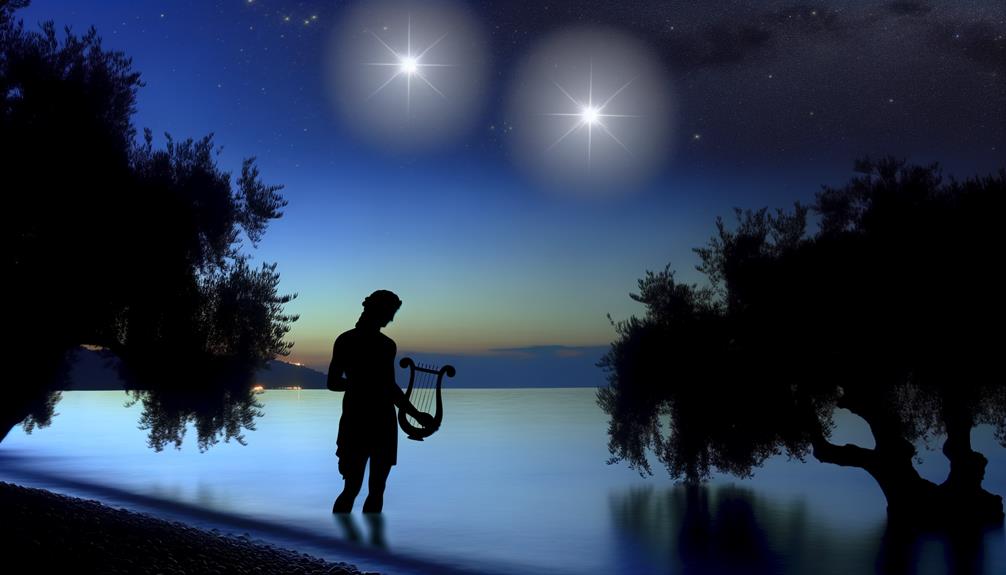Meaning of the Name Castor
The name Castor is derived from the Greek word 'Κάστωρ' (Kástōr), meaning 'beaver,' symbolizing industriousness and resourcefulness. In Greek mythology, Castor was one of the Dioscuri, renowned for his divine and mortal parentage, and his heroic exploits alongside his twin brother, Pollux.
Castor's legacy extends to astronomy, where he is immortalized in the constellation Gemini. In historical and literary contexts, the name signifies loyalty, ingenuity, and martial prowess.
This rich etymological and cultural heritage highlights the enduring significance of the name Castor. For further nuances and historical impacts, continue exploring this remarkable name.

Key Takeaways
- Castor originates from the Greek word for 'beaver,' symbolizing industriousness and resourcefulness.
- In Greek mythology, Castor is known as the mortal son of Leda and Zeus and twin of Pollux.
- The name Castor is associated with heroism, particularly in the context of the heroic Dioscuri twins.
- In astronomy, Castor refers to a prominent star system in the constellation Gemini.
- Castor signifies qualities of divine protection, fraternal loyalty, and martial prowess.
Etymology of Castor
The etymology of the name 'Castor' can be traced back to ancient Greek mythology, where it originates from the Greek word 'Κάστωρ' (Kástōr), meaning 'beaver.' This term was not only a reference to the animal but held symbolic significance in Greek culture, often associated with industriousness and resourcefulness.
Linguistically, the name 'Castor' has journeyed through various cultures and languages, maintaining its mythological roots while adapting to phonetic changes over centuries. The shift from Greek to Latin preserved its original connotation, further embedding it into Western lexicon.
The rich etymological journey of 'Castor' reflects a blend of natural imagery and mythological heritage, essential for understanding its enduring legacy in cultural and linguistic contexts.
Castor in Greek Mythology
In Greek mythology, Castor is renowned for his divine parentage, being the mortal son of Leda and Zeus, who visited her in the guise of a swan. He is inseparable from his heroic twin brother, Pollux, with whom he shares the collective identity of the Dioscuri, celebrated for their valiant deeds.
Additionally, Castor's role as one of the Argonauts underscores his significance in mythological narratives, particularly in the quest for the Golden Fleece.
Castor's Divine Parentage
Castor, renowned in Greek mythology, is traditionally depicted as the mortal son of Leda and Tyndareus, while some accounts attribute his divine lineage to Zeus. This duality in parentage reflects the complex interplay of mortal and divine elements common in mythological narratives.
Linguistically, the name 'Castor' derives from the Greek word 'kástōr,' which may be linked to the term for 'beaver,' symbolizing industry and protection. Culturally, Castor's potential divine origin introduces themes of heroism and semi-divine status, emphasizing his unique position in the mythos.
Etymologically, the ambiguity surrounding his paternity enriches his character, offering a nuanced perspective on his role within the pantheon. This dual lineage underscores the fluid boundaries between gods and mortals in ancient Greek belief systems.
Heroic Twin Brother
Frequently celebrated for his bravery and martial prowess, Castor, alongside his twin brother Pollux, embodies the archetype of heroic siblings in Greek mythology. Known collectively as the Dioscuri, their bond transcends mere kinship, representing unity and valor. Castor, a mortal, and Pollux, immortal, were sons of Leda, with their contrasting natures highlighting their complementary strengths. The etymology of Castor traces to the Greek word "Kastōr," meaning 'beaver,' symbolizing industriousness and determination. Their legendary feats and contributions to Greek mythology affirm their status as quintessential heroic figures.
| Attribute | Castor | Pollux |
|---|---|---|
| Parentage | Mortal, son of Leda | Immortal, son of Zeus and Leda |
| Skills | Equestrian, martial prowess | Boxing, immortal strength |
| Symbolism | Industriousness, determination | Valor, divine protection |
This duality enriches their narrative, illustrating complex human and divine interplay.
Role in Argonauts
Among the illustrious members of the Argonauts, Castor's role was essential, particularly due to his exceptional equestrian skills and martial expertise. His contributions to this legendary expedition were manifold, reflecting not only his physical prowess but also his strategic acumen.
- Equestrian Mastery: Castor was renowned for his ability to tame and ride horses, a skill that often proved pivotal during the Argonauts' journey.
- Combat Proficiency: His martial skills, particularly in hand-to-hand combat, made him an invaluable asset in battles against various adversaries.
- Twin Synergy: Alongside his brother Pollux, Castor exemplified the ideal of fraternal cooperation, enhancing their collective effectiveness.
Thus, Castor's multifaceted role in the Argonauts underscores his enduring legacy in Greek mythology.
The Legend of Castor and Pollux
The legend of Castor and Pollux, central to the narrative of the Dioscuri, epitomizes the bond between mythical twin brothers, one immortal and the other mortal.
Castor, whose name is etymologically linked to the term 'beaver,' contrasts with Pollux, whose divine nature underscores their unique fraternal relationship.
This duality not only enriches Greek mythology but also offers profound insights into themes of mortality and immortality within ancient cultural contexts.
Mythical Twin Brothers
In Greek mythology, Castor and Pollux, also known as the Dioscuri, are celebrated twin brothers whose storied bond and heroic exploits have been immortalized in both literature and the stars. Their narrative underscores the profound significance of fraternal unity and valor.
The name Castor, derived from the Greek word κάστωρ (kástōr), signifies 'beaver,' symbolizing resourcefulness and industriousness. The Dioscuri are associated with:
- Heroic Deeds: Their participation in the Argonauts' quest showcases their bravery.
- Celestial Recognition: Their transformation into the Gemini constellation highlights their eternal legacy.
- Cultural Impact: Their legend profoundly influenced Roman and Greek traditions, epitomizing brotherhood.
This exploration into their mythological presence offers a nuanced understanding of their enduring legacy.
Immortal and Mortal Bond
Rooted in the rich tapestry of Greek mythology, the legend of Castor and Pollux illustrates the poignant interplay between mortality and immortality. Castor, born of Leda and Tyndareus, was mortal, whereas Pollux, son of Leda and Zeus, possessed immortality. Their bond, unbreakable even by death, led Pollux to share his divine essence, allowing them to alternate between Olympus and Hades.
| Character | Parentage | Mortal Status |
|---|---|---|
| Castor | Leda and Tyndareus | Mortal |
| Pollux | Leda and Zeus | Immortal |
| Zeus | Father of Pollux | Immortal |
| Leda | Mother of Both | Mortal |
| Tyndareus | Father of Castor | Mortal |
This myth encapsulates the complexities of familial bonds, transcending the boundary between life and death.
Castor in Astronomy
Castor, a prominent feature in the constellation Gemini, is a fascinating subject in the field of astronomy due to its complex star system. As one of the brightest stars in the night sky, Castor is not a single star but a sextuple system, consisting of three binary pairs. This intricate system offers a wealth of information for astronomers.
- Multiplicity: Castor is composed of six stars, organized into three binary pairs.
- Spectral Classes: The stars in the Castor system exhibit a range of spectral classes, providing a broad spectrum for study.
- Etymology: The name 'Castor' derives from Greek mythology, where Castor was one of the Dioscuri, symbolizing the duality inherent in its star system.
This celestial marvel embodies both scientific intrigue and cultural significance.
Historical Figures Named Castor
Among historical figures, the name Castor has been borne by various individuals whose contributions span different cultures and epochs, reflecting its enduring legacy.
In ancient Greece, Castor was one of the Dioscuri, twin brothers revered in mythology, embodying strength and protection. The name, derived from the Greek 'Kastor,' meaning 'beaver,' signifies industriousness and ingenuity.
Castor of Rhodes, a historian from the Hellenistic period, enriched historical knowledge through his writings.
In Roman times, Castor was a common name, often linked with bravery and leadership. These diverse applications underscore the name's deep cultural resonance and its capacity to symbolize virtues esteemed across different historical contexts, perpetuating its significance through time.
Castor in Literature
Literary representations of the name Castor often draw upon its mythological and historical connotations to enrich narratives with themes of heroism, loyalty, and ingenuity. Derived from Greek mythology, Castor, one of the Dioscuri twins, symbolizes fraternal devotion and adventurous spirit.
When utilized in literature, the name frequently embodies three core elements:
- Heroic Attributes: Characters named Castor often exhibit bravery and valor, echoing the mythological hero's exploits.
- Loyalty and Brotherhood: The bond between Castor and Pollux serves as a profound example of steadfast loyalty.
- Ingenuity and Skill: Reflecting Castor's renowned equestrian prowess, literary figures with this name are often depicted as skilled and resourceful.
This etymological resonance guarantees that the name Castor remains a potent literary device, imbuing characters with depth and cultural significance.
Cultural Significance
The cultural significance of the name Castor extends beyond its mythological roots, permeating various aspects of art, astronomy, and even modern nomenclature. Originating from Greek mythology, Castor, one of the Dioscuri twins, symbolizes protection and adventure. In astronomy, Castor is a prominent star in the Gemini constellation, highlighting its celestial importance. Artistic representations often depict Castor and Pollux, underscoring themes of brotherhood and heroism. Additionally, the name has been adopted in various contemporary contexts, reflecting its enduring resonance.
| Domain | Significance | Example |
|---|---|---|
| Mythology | Symbolizes protection, adventure | Dioscuri twins |
| Astronomy | Celestial importance | Gemini constellation |
| Art | Depictions of brotherhood, heroism | Classical and modern artworks |
| Nomenclature | Enduring resonance | Names in literature and media |
Through these lenses, Castor's multifaceted cultural relevance is evident.
Modern Usage
In contemporary usage, the name Castor continues to embody its rich historical and cultural heritage, finding resonance in diverse fields ranging from literature to popular media. Its application spans various contexts:
- Literature: Castor appears in modern novels and poetry, often symbolizing duality, strength, and loyalty.
- Astronomy: The name is given to one of the brightest stars in the Gemini constellation, reflecting its celestial significance.
- Popular Media: Characters named Castor frequently emerge in films and television, invoking traits linked to classical mythology.
Linguistically, the name derives from the Greek word 'kastor,' denoting a beaver, which historically symbolizes industriousness. Culturally, its enduring legacy is a proof of the name's adaptability and resonant symbolism across time.
Symbolism and Meaning
Castor, a name steeped in classical mythology, embodies multifaceted symbolism ranging from divine protection to fraternal loyalty. Derived from the Greek word 'kástōr,' it traces back to one of the Dioscuri twins, Castor and Pollux, revered in ancient Greco-Roman culture.
Castor's association with horsemanship and prowess in battle symbolizes strength and skill. The mythological narrative accentuates themes of brotherly devotion, as Castor and Pollux are often depicted inseparably, showcasing unparalleled fraternal love and sacrifice.
This duality of martial competence and familial bond endows the name with a rich cultural and etymological heritage, making it a timeless emblem of virtue and camaraderie. In this way, Castor signifies more than a name; it encapsulates an enduring legacy of valor and unity.
Conclusion
Despite the name Castor originating from ancient Greek mythology and etymologically linked to the word for 'beaver,' its modern usage spans astronomical, literary, and cultural contexts.
Ironically, a name once associated with divine twins and celestial bodies now graces mundane settings. The profound historical and symbolic layers of Castor appear almost incongruous in everyday use, underscoring the rich tapestry of human linguistic evolution.
Therefore, a name rooted in myth persists in contemporary relevance, albeit in markedly transformed forms.






